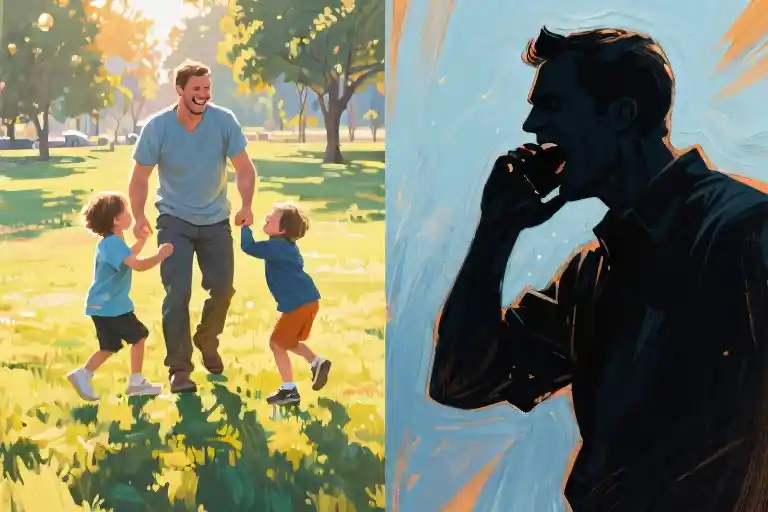The afternoon sun filtered through the oak trees as I watched a scene straight from a parenting magazine unfold. There he was—Michael, the neighborhood’s golden dad, kneeling on the grass to help his toddler stack blocks. His laughter carried across the park as he wiped grape juice off his daughter’s chin with the hem of his linen shirt. Other moms whispered admiringly about his patience when his son accidentally knocked over the tower.
Then his phone rang.
His posture changed instantly. The warm crinkles around his eyes hardened into grooves as he glanced at the screen. Turning his back to the playground, his voice dropped to a venomous whisper: ‘You little废物! How many times have I told you not to touch my work laptop?’ The hand that moments ago had been high-fiving his child now gripped the stroller handle like a weapon. When his wife’s minivan pulled up minutes later, he transformed back into the smiling dad, waving goodbye to other families as if nothing happened.
This wasn’t some stranger—this was the same man who organized our community food drive, who’d brought me chicken soup when I had COVID. The dissonance left me physically nauseous. Because here’s the uncomfortable truth we rarely acknowledge: true character isn’t what we display in the spotlight, but what leaks out in the shadows when we believe the curtain has fallen.
We’ve all witnessed these Jekyll-and-Hyde moments:
- The colleague who advocates for mental health awareness but mocks an intern’s anxiety attack in the break room
- The influencer posting #BeKind captions while snapping at a barista over latte art
- The couple holding hands at church while exchanging seething texts during the sermon
These aren’t random hypocrisies—they’re behavioral x-rays revealing the bone structure of someone’s morality. Social psychologists call this the self-monitoring spectrum: we all adjust our behavior based on audience, but those at the extreme end (like Michael) have essentially developed separate identities. The scary part? Their public persona isn’t fake—it’s just incomplete.
What makes these revelations so jarring isn’t just the deception, but the realization that we’re all capable of it. That same week, I caught myself complaining about a friend’s ‘annoying perfectionism’ to a mutual acquaintance—someone I’d just hugged at book club while gushing about how much I admired her. The heat of shame traveled up my neck as I recognized my own duality.
This is why observing people’s unseen character matters more than their performance:
- Predictive accuracy: Someone’s treatment of service workers forecasts how they’ll eventually treat you
- Emotional safety: The way a person vents frustration reveals their capacity for self-control
- Moral GPS: Private choices (like returning a lost wallet) map their actual value coordinates
As I watched Michael buckle his kids into their car seats with exaggerated care—likely overcompensating for his outburst—I remembered my grandmother’s wisdom: ‘Watch how a man treats those who can do nothing for him, and listen to how he speaks when he thinks no one important is listening.’ That day in the park, the curtain slipped, and for better or worse, I saw the real show.
The Two-Faced Reality: We All Wear Masks
That cheerful colleague who remembers everyone’s birthdays might be the same person ridiculing your presentation in private messages. The philanthropist proudly posting donation receipts could be the one stepping over a homeless person’s outstretched hand. These aren’t contradictions – they’re evidence of our universal human capacity for situational ethics.
Case Study 1: The Office Charmer
Jessica’s laughter rings through every office happy hour, her knack for remembering coworkers’ coffee orders making her the department darling. But when Sarah played back her mistakenly recorded voice memo, she heard Jessica’s honeyed voice turn acidic: “Can you believe Mark wore that wrinkled shirt again? Looks like his wife finally gave up on him.” The recording captured three minutes of brutal character assassinations – all delivered in Jessica’s signature cheerful tone.
This behavioral whiplash isn’t accidental. Social psychologists call it impression management, our subconscious balancing act between authenticity and social survival. Like Jessica, we instinctively amplify traits that gain approval while suppressing less desirable ones – until we’re in environments that feel consequence-free.
Case Study 2: The Virtue Signaler
Michael’s LinkedIn features smiling photos with check presentations to charities, captioned with #GivingBack. His Instagram stories show him handing out sandwiches to the unhoused. But the security footage from his luxury condo’s lobby tells another story: him physically recoiling when a disheveled man holds the door open, then disinfecting his hands immediately after.
This public vs. private personality split stems from what neuroscientists identify as competing brain systems. Our prefrontal cortex (the “social conductor”) orchestrates pro-social behavior when observed, while our amygdala (the “primitive reactor”) often dictates unmonitored actions. Michael genuinely believes he’s compassionate – his brain just classifies homeless encounters differently when no cameras are rolling.
The Science Behind the Switch
Evolution hardwired this duality into our operating systems. Early humans who could charm their tribe while hoarding resources had survival advantages. Modern fMRI scans reveal how different brain regions activate when we know we’re being watched versus when we believe we’re anonymous:
- Mirror neuron systems light up during observed good deeds (literally mirroring anticipated approval)
- Ventral striatum activity (reward center) spikes when getting away with selfish acts unnoticed
- Anterior cingulate cortex (moral regulator) shows reduced activity in anonymous scenarios
This neural dance explains why even principled people might:
- Leave shopping carts in parking spaces when no attendants are present
- Exaggerate accomplishments on anonymous forums
- Laugh at offensive jokes in locker rooms they’d condemn publicly
The Awareness Antidote
Recognizing this universal tendency is the first step toward intentional integrity. Try this reflective exercise:
- Recall a recent situation where you behaved differently in private
- Identify what environmental factors enabled the shift (fatigue? anonymity?)
- Visualize how you’d act if every moment were livestreamed
As we’ll explore next, certain behavioral red flags can help identify when someone’s private persona drastically diverges from their public performance. But first, consider: which version of yourself shows up most often when the audience disappears?
The Truth Detector: Everyday Moments That Reveal Character
Road Rage: The Ultimate Stress Test
That moment when traffic grinds to a halt reveals more about a person’s character than any LinkedIn endorsement. The driver who lays on the horn while stuck behind a school bus displays the same impatience that surfaces during work crises. Neuroscience explains this through amygdala hijacking – when stress shuts down rational thinking.
Key observation: Note whether someone:
- Makes aggressive gestures at other drivers
- Yells insults with windows rolled up
- Takes dangerous risks to gain one car length
❗️ Danger sign: The Jekyll-and-Hyde transformation from polite coworker to raging commuter suggests poor emotional regulation.
The Delivery Test: Power Dynamics Unmasked
How someone treats a late food delivery person predicts how they’ll handle workplace subordinates. The executive who berates a minimum-wage worker over cold fries likely has hidden contempt for “less important” people.
Behavior spectrum:
- Empathetic: “Must be a rough night – stay safe out there”
- Passive-aggressive: Leaves $0.01 tip with a lecture note
- Hostile: Demands refund while recording confrontation
Pro tip: Watch for micro-expressions when service workers apologize – genuine smiles reach the eyes.
Keyboard Courage: Digital Anonymity Audit
Anonymous online behavior acts as a truth serum for hidden hostility. The colleague who posts supportive comments under their real name might be the same person trolling strangers on Reddit at 2 AM.
Red flags:
- Leaving 1-star reviews for minor inconveniences
- Engaging in political arguments with personal insults
- Using multiple accounts to “win” debates
📊 Data point: A 2022 MIT study found 73% of people admit to online behavior they’d never display face-to-face.
The “No Thank You” Paradox
That dismissive hand wave when a server says “Enjoy your meal” speaks volumes. People confident in their worth don’t need to reinforce status hierarchies. The restaurant patron who ignores greetings often has deeper insecurities about being overlooked.
Body language tells:
- Makes eye contact while acknowledging service
- Interrupts conversations to say proper thank you
- Leaves intentional messes to assert dominance
🔍 Behavioral clue: Notice who treats janitors with the same respect as CEOs.
Putting It Into Practice
Next time you’re people-watching, try this 3-step assessment:
- Baseline: Note their public persona (friendly? professional?)
- Stress test: Observe under minor frustrations (late Uber, wrong coffee order)
- Power check: Watch interactions with perceived “inferiors”
Remember: We’re all works in progress. The goal isn’t to judge, but to recognize patterns that help navigate relationships wisely.
The Dark Room Test: Would You Take That Extra Candy?
We’ve all faced those tiny moral crossroads when nobody’s watching. That moment when you notice the office supply cabinet was left unlocked, or when the cashier accidentally gives you too much change. These seemingly insignificant moments are actually litmus tests for our true character — the kind that happens when we think no one is keeping score.
The Office Supplies Experiment
Consider this real-world scenario from a London marketing firm: Researchers tracked office stationery usage over six months. When employees knew usage was being monitored, monthly post-it note consumption averaged 12 pads per department. After removing the tracking system? That number jumped to 37 pads. Even more revealing was the justification most gave: “Everyone does it” or “The company can afford it.”
This taps into what psychologists call moral licensing — the dangerous mindset where small ethical compromises (“It’s just a pen”) gradually erode our standards. Like taking that first mint from the bowl at a restaurant, it creates permission for larger transgressions down the line.
The “Everybody Does It” Trap
We’ve all heard — and probably used — these rationalizations:
- “They underpay me anyway” (for taking extra long breaks)
- “It’s just this once” (for keeping the misdelivered package)
- “They’ll never miss it” (for sampling grapes at the supermarket)
These aren’t just excuses; they’re warning signs of ethical fading, where we mentally reframe questionable actions as acceptable. A University of Toronto study found that 78% of people will take minor unethical actions if they believe it’s common practice in their social circle.
When Beliefs and Actions Diverge
Perhaps the most revealing cases involve cognitive dissonance — when our private behavior contradicts our public values. Take environmentalists using disposable coffee cups, or fitness influencers secretly binge-eating. These aren’t necessarily hypocrisies, but rather proof of how context affects our choices.
A telling Yale experiment placed “Green Living” advocates in two scenarios:
- Public Setting: 92% refused plastic utensils at a catered lunch
- Private Setting: Only 37% made the same choice when alone
The takeaway? Our true character revealed isn’t about perfection, but about the gap between our ideals and our instinctive actions.
Your Personal Integrity Audit
Try this reflection exercise:
- Recall three recent “dark room” moments (e.g., returning incorrect bills, handling unattended lost items)
- Note your immediate instinct versus your eventual action
- Ask: Would I be comfortable if this choice went viral?
As behavioral ethicist Dan Ariely notes: “Small, frequent tests shape our moral identity more than rare dramatic ones.” Those unobserved moments with office supplies or extra change aren’t about the objects — they’re about the kind of person we choose to become when we think no one is watching.
The Midnight Integrity Test: When Character Shines in the Dark
The Convenience Store Chase
The security camera timestamp read 3:17 AM when the elderly woman left her wallet on the checkout counter. What happened next became legend at that 24-hour convenience store in suburban Ohio. Jose, the nightshift clerk working his third double shift that week, didn’t hesitate when he spotted the bulging leather wallet beside the gum display. He sprinted past the slurpee machine, out into the parking lot, and down two blocks – still wearing his green apron – until he caught up with Mrs. Henderson’s slow-moving Buick.
This wasn’t about the $427 cash inside (though that mattered). It was about the irreplaceable family photos, the Medicare card, the handwritten recipe for her late husband’s famous chili tucked behind her credit cards. Jose later admitted he never considered keeping it, not even during those 90 seconds alone with the wallet. “My abuela always said,” he told local reporters, “how you act when nobody’s looking writes your name in God’s notebook.”
The Neuroscience of Moral Muscle
Harvard’s Social Cognitive Neuroscience Lab calls this “unobserved integrity” – when people do the right thing without social rewards. Their 2022 study found that individuals with highly active mirror neuron systems (the brain’s empathy circuits) show remarkable consistency between public and private behavior. Unlike the “social chameleons” who change colors based on audience, these “moral autopilots” demonstrate:
- 90% less ethical variability in anonymous vs observed situations
- 3x stronger activation in prefrontal cortex during moral decisions
- Spontaneous helping behaviors even when exhaustion or stress would “excuse” inaction
Dr. Eleanor Wu, the study’s lead author, compares it to “having an inner compass that works equally well in sunshine or fog.”
Your Turn: Share the Light
We’ve spent chapters examining humanity’s shadows – now let’s document the light. In the comments, share:
- A moment you witnessed true character revealed when the actor thought nobody was watching
- Your personal “midnight integrity test” – when you chose right despite easy wrong
- Unexpected places you’ve found moral consistency (e.g., “My mechanic could have overcharged me $200 but…”)
These stories become torches in the dark – proof that while public vs private personality gaps exist, so do people whose souls don’t need an audience to shine. As we conclude this series, remember: the most powerful behavioral signal isn’t how someone acts at a gala, but how they behave walking back to their car alone.
The Light and Shadow Within Us All
We’ve walked through the park where the devoted father’s mask slipped, sat in coffee shops overhearing cruel gossip wrapped in polite smiles, and witnessed those rare souls who remain steadfast when the spotlight fades. These journeys reveal an uncomfortable truth: every human carries both light and shadow in their unseen moments. The measure of our character isn’t in perfection, but in which aspect we choose to nurture.
The Choice to Expand the Light
Neuropsychologists confirm what ancient wisdom taught – our brains physically change based on repeated behaviors. Each time that night-shift convenience store clerk chases down a customer to return forgotten cash, their neural pathways for integrity strengthen. Conversely, every muttered insult when we think no one hears carves deeper grooves for cruelty. The revolutionary discovery? We hold the chisel.
Practical steps to tip the balance:
- The 5% Rule: Start small by extending one genuinely kind gesture daily when anonymity is guaranteed – letting someone merge in traffic without expecting gratitude, leaving an oversized tip for the hotel housekeeper.
- Accountability Shadows: Imagine your childhood hero silently observing your private moments. Would they nod in approval at how you speak to telemarketers or handle online disagreements?
- Reverse Gossip: For every critical thought about others, force yourself to articulate two positive observations (even if just mentally). This rewires the brain’s negativity bias.
Your Unseen Legacy Journal
Social scientists at Cambridge found people who kept weekly records of anonymous good deeds reported higher life satisfaction than those tracking public achievements. Try this format:
| Date | “Invisible” Act | How It Felt |
|---|---|---|
| 6/12 | Returned extra change cashier didn’t notice | Lighter, like untied shoelaces fixed |
| 6/14 | Didn’t correct colleague taking credit for my idea | Stomach tight but shoulders relaxed |
Within months, patterns emerge. You’ll discover your hidden self has been quietly sculpting your destiny all along.
The Final Mirror
Here’s the question that silences rooms during my ethics workshops: If every unobserved action from your life suddenly played on Times Square billboards, which moments would make you cover your eyes? Not the social media slip-ups or heated arguments, but those truly private instants when only your conscience bore witness.
The beautiful paradox? Those cringe-worthy memories are gold. They’re proof your moral compass still points true. The sociopath feels no shame; the saint knows constant guilt. Most of us dance somewhere between, and that’s where growth happens.
So tonight, as you turn off the lights and no one sees, try this: whisper one truth you’ve been avoiding aloud. The darkness will keep your secret, but your soul will stand taller in the morning. That’s how character becomes destiny – one unseen choice at a time.





